

IkamvaYouth continues to grow; a new branch has been established in Ikageng Township, Potchefstroom, in the North West. This branch has been honoured with an Orange IkamvaYouth logo, a warm and inviting colour, the colour associated with the gentle warmth of the sun.
Our new Branch Coordinator, Zanele Mdletye is putting the IkamvaYouth print in the North West. We are pleased to announce that ground work in establishing a new branch in Ikageng has begun! IkamvaYouth has since received a warm welcome from the community of Ikageng. Four schools are on board with the programme, learner recruitment forms have been issued. The learner response has been awesome. We are on the verge of securing office space as well as tutoring venue, negotiations are in progress.
The North West University, Potchefstroom Campus recently gave us a platform to recruit for tutors. We are still navigating our way with Vuselela College and Agricultural College. Our mission is to recruit a dedicated army of volunteers to start tutoring learners by the end of February.
We are looking forward to working together with the community of Ikageng to achieve better results.
Those inspired by Orange are always on the go! Watch this space.


A mere invitation to the Nyanga Open Day was not enough for New Eisleben High School, who requested that IY come and conduct a second ‘Open Day’ to its leaners in their school hall. The Nyanga team happily obliged and on the 23rd of January, spent precious time with the school’s learners, telling them about IY and the support available for them throughout the year.
The learners listened attentively and asked many questions afterwards, betraying a genuine interest in the program and how it runs. The principal, Mr Mazimela is enthusiastic about the IY model and approach and asked why IY does not launch the tutoring program from the schools, since it is a valuable intervention. This is an exciting query, very much aligned with IY’s 2030 vision, and IY Nyanga is looking forward to working with the school towards 2030, and beyond!
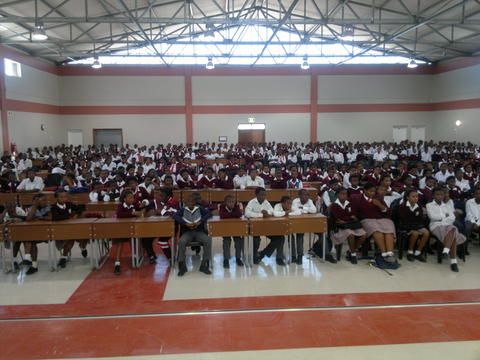
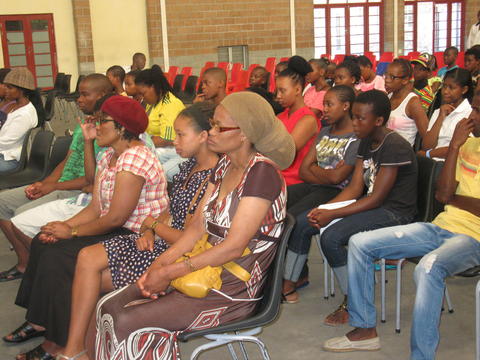

High School students and parents from Nyanga and surrounding areas trekked to Oscar Mpetha High School to hear all about IY Nyanga this last Saturday the 19th of January.
The school hall comfortably seated the 80 people who were in attendance, who included current and prospective Ikamvanites, parents, school staff and volunteers. The branch coordinator, Shuvai Finos welcomed the group, and introduced Funeka’s story, which explains the IY model in 3minutes. Branch Assistant, Asanda Nanise then took over the reins and got straight into fleshing out the IY model as explained by the video clip. Asanda explained the application process, the attendance requirements and the infamous, yet effective kickouts which are conducted every term.
Afterwards, a question and answer segment followed where concerned parents asked whether learners could only attend during Winter School, if they live far from the branch, or alternatively, on Saturdays only. Asanda explained the need for learners to attend regularly so as to get constant and consistent input which is much needed as part of IY’s intervention into learners’ education.
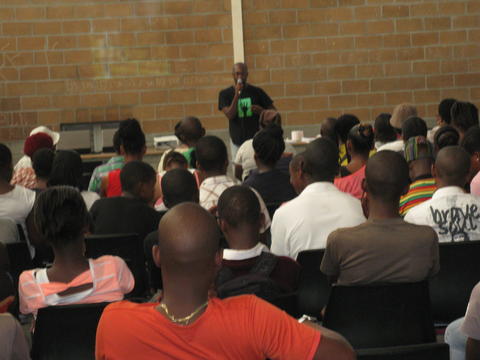
At the end of the session, parents and learners collected application forms and then set off, excited to start the journey towards becoming full-fledged Ikamvanites.
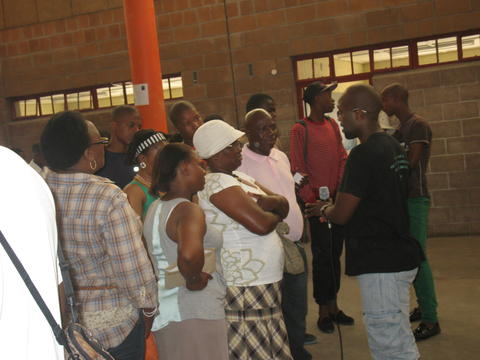
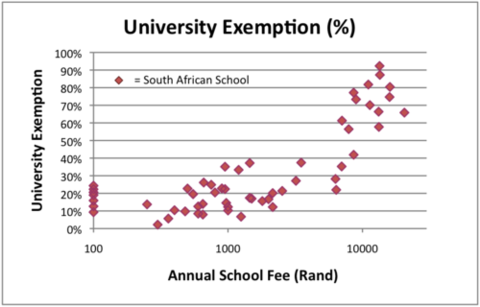
Just over a year ago I was approached by Andrew Einhorn, a UCT grad student, who was interested in implementing an online maths program at Makhaza. All he needed was access to the lab, access to a class and a tutor. A year down the line not only he has completely revamped two of our branches labs in Makhaza and Nyanga, established a formal Khan Academy program in these branches (as well as other locations in Cape Town and rural Eastern Cape), but has produced results at very low costs, and is piloting in schools for 2013.
His passion for creating high impact and stimulating learning environments in township and rural locations often only privy to the wealthy few has seen him start Numeric, an NGO interested in finding ways to bring Khan Academy to South Africa and make it a useful resource to both teachers and learners. He presented an inspiring TEDxUCT talk last year outlining the background, as well as the impact and results Numeric has had. He also posted the following blog on the Khan Academy website:

A little over 15 months ago, we started an experiment. We wanted to know if Khan Academy was viable in township (slum) areas in South Africa and if so, what type of impact it might have on numeracy. Numeracy in South Africa is astonishingly weak, with just 2% of Grade 9s scoring over 50% on the annual national assessments in 2012.
And so we set out to see if Khan Academy might be used as a catalyst for change. But before I expound on the results of this experiment, I ought perhaps give a little more background on the environments we’re working in.
Townships in South Africa are not unlike the favelas of Brazil or the slums bordering Delhi and Calcutta in India. They are urban areas that were, until the end of Apartheid in 1994, reserved for non-whites, but have now become residential hubs for the urbanizing masses. They are typically built on the periphery of cities and tend to be characterized by high population density, poverty and unemployment. Picture a ramshackle of makeshift houses constructed out of corrugated iron, wood scraps and cardboard, jigsawed together into a gigantic maze 5 miles wide and 10 miles across. At the risk of generalising grossly, that’s more or less the picture I want you to have in mind as you read this article.
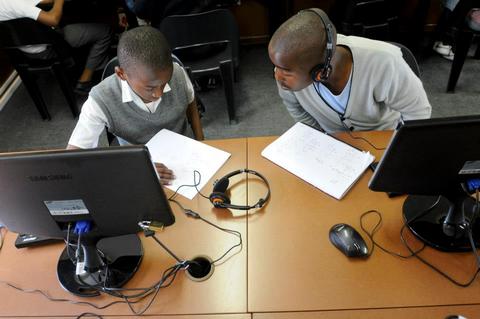
Now, townships in South Africa get a bad rap. They are viewed as ‘dangerous’ places and it is considered unwise to visit them unless you know someone there, or visit them as part of a ‘township tour’. Yet while crime rates in these areas are often high, the reputation does not do justice to the vibrant and persevering people who inhabit them. In particular, townships are YOUNG! On any given day, around two o’clock in the afternoon, the streets flood with uniformed, backpack-toting children on their way home from school. And despite having barely two pennies to rub together, they are meticulously dressed – shiny black shoes, starched white collars – and have aspirations to match. Most of the children in South Africa live in some form of township, which means that children growing up in these environments constitute the better part of the future of our country.
And yet it is supremely difficult to convince our best teachers to go and work in these areas. They are offered good jobs in well-resourced schools most often located in the wealthy suburbs of the cities. Principals at these schools compete fiercely for their skills. And this is as it should be. But it also entrenches the educational bias whereby a child’s access to quality education is directly proportional to the wealth of their family (see chart below).

* University exemption rate refers to the percentage of learners who attain the academic marks in their final year of school that are necessary to gain access to South African universities.
So Numeric’s experiment was to see whether we could use Khan Academy, in conjunction with a slightly less skilled (and often unqualified) math coach, to create the high impact and stimulating learning environments enjoyed by kids living in wealthier suburbs.
The opportunity provided by Khan Academy premised on the following: Videos do not argue about where they are played; they are unaffected by crime and environment. Appropriately licensed, they do not cost anything. They do not grow weary, skip class, or grow jaded. Instead, they convey their message enthusiastically, faithfully, clearly – time and time again. A child may watch just as many videos as he/she has appetite for, and need never feel limited by the dragging on of a boring class or an inept teacher. For many children in South Africa, a Khan Academy video will be their first exposure to what we might term ‘world class instruction’. When complemented by the exercises on the Knowledge Map, Khan Academy becomes a powerful tool for turning the tide on numeracy in South Africa.
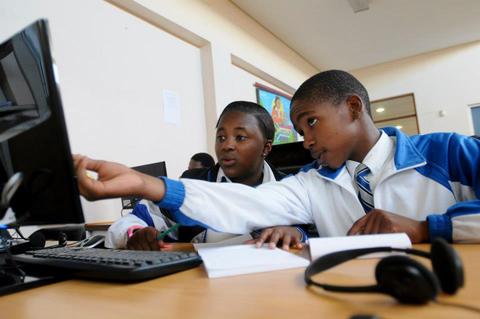
So what were the results of the experiment? Well, it’s probably too early to draw any major conclusions, but we do have a few figures we’d like to share. We currently run 7 Khan Academy classes across 3 different hubs in the Eastern and Western Cape provinces of South Africa. The first pilot group of 20 Grade 9s has just completed its first twelve months of Khan Academy and their numbers are as follows:
* Total Khan Academy hours delivered: 2220
* Total Problems Solved: 27,988
* Total Problems per learner: 1399
* Total Khan Modules Complete: 1232
* Average Modules per learner: 62
Bearing in mind this is an afterschool programme, these are 27,988 math problems that would not otherwise have been attempted. The 62 modules completed by the average learner constitute 62 gaps that those learners have filled. But it’s more about just the numbers; it’s about creating excitement and enthusiasm around learning. This is hard to convey in words, but perhaps a picture will suffice.

As we always say to our coaches, the tragedy in South Africa is not so much that kids don’t want to learn. It’s that some kids DO want to learn, but can’t. Khan Academy provides us one way to give these kids a world-class education without having to magically replenish our nation’s supply of teachers. And who knows, perhaps one day these kids will become the inspirational and talented teachers we have waited for for so long!
—-
Andrew Einhorn is the founder and current CEO of Numeric.org. His TEDx talk on Numeric.org and Khan Academy is available here.
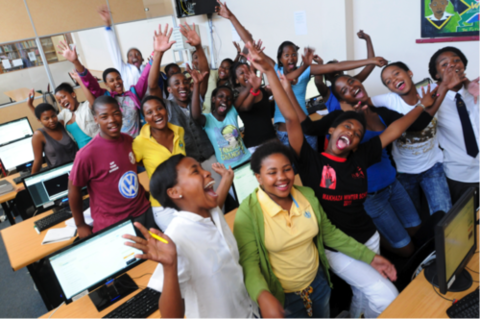
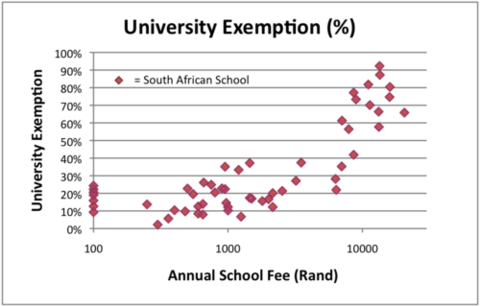
Just over a year ago I was approached by Andrew Einhorn, a UCT grad student, who was interested in implementing an online maths program at Makhaza. All he needed was access to the lab, access to a class and a tutor. A year down the line not only he has completely revamped two of our branches labs in Makhaza and Nyanga, established a formal Khan Academy program in these branches (as well as other locations in Cape Town and rural Eastern Cape), but has produced results at very low costs, and is piloting in schools for 2013.
His passion for creating high impact and stimulating learning environments in township and rural locations often only privy to the wealthy few has seen him start Numeric, an NGO interested in finding ways to bring Khan Academy to South Africa and make it a useful resource to both teachers and learners. He presented an inspiring TEDxUCT talk last year outlining the background, as well as the impact and results Numeric has had. He also posted the following blog on the Khan Academy website:

A little over 15 months ago, we started an experiment. We wanted to know if Khan Academy was viable in township (slum) areas in South Africa and if so, what type of impact it might have on numeracy. Numeracy in South Africa is astonishingly weak, with just 2% of Grade 9s scoring over 50% on the annual national assessments in 2012.
And so we set out to see if Khan Academy might be used as a catalyst for change. But before I expound on the results of this experiment, I ought perhaps give a little more background on the environments we’re working in.
Townships in South Africa are not unlike the favelas of Brazil or the slums bordering Delhi and Calcutta in India. They are urban areas that were, until the end of Apartheid in 1994, reserved for non-whites, but have now become residential hubs for the urbanizing masses. They are typically built on the periphery of cities and tend to be characterized by high population density, poverty and unemployment. Picture a ramshackle of makeshift houses constructed out of corrugated iron, wood scraps and cardboard, jigsawed together into a gigantic maze 5 miles wide and 10 miles across. At the risk of generalising grossly, that’s more or less the picture I want you to have in mind as you read this article.

Now, townships in South Africa get a bad rap. They are viewed as ‘dangerous’ places and it is considered unwise to visit them unless you know someone there, or visit them as part of a ‘township tour’. Yet while crime rates in these areas are often high, the reputation does not do justice to the vibrant and persevering people who inhabit them. In particular, townships are YOUNG! On any given day, around two o’clock in the afternoon, the streets flood with uniformed, backpack-toting children on their way home from school. And despite having barely two pennies to rub together, they are meticulously dressed – shiny black shoes, starched white collars – and have aspirations to match. Most of the children in South Africa live in some form of township, which means that children growing up in these environments constitute the better part of the future of our country.
And yet it is supremely difficult to convince our best teachers to go and work in these areas. They are offered good jobs in well-resourced schools most often located in the wealthy suburbs of the cities. Principals at these schools compete fiercely for their skills. And this is as it should be. But it also entrenches the educational bias whereby a child’s access to quality education is directly proportional to the wealth of their family (see chart below).

* University exemption rate refers to the percentage of learners who attain the academic marks in their final year of school that are necessary to gain access to South African universities.
So Numeric’s experiment was to see whether we could use Khan Academy, in conjunction with a slightly less skilled (and often unqualified) math coach, to create the high impact and stimulating learning environments enjoyed by kids living in wealthier suburbs.
The opportunity provided by Khan Academy premised on the following: Videos do not argue about where they are played; they are unaffected by crime and environment. Appropriately licensed, they do not cost anything. They do not grow weary, skip class, or grow jaded. Instead, they convey their message enthusiastically, faithfully, clearly – time and time again. A child may watch just as many videos as he/she has appetite for, and need never feel limited by the dragging on of a boring class or an inept teacher. For many children in South Africa, a Khan Academy video will be their first exposure to what we might term ‘world class instruction’. When complemented by the exercises on the Knowledge Map, Khan Academy becomes a powerful tool for turning the tide on numeracy in South Africa.

So what were the results of the experiment? Well, it’s probably too early to draw any major conclusions, but we do have a few figures we’d like to share. We currently run 7 Khan Academy classes across 3 different hubs in the Eastern and Western Cape provinces of South Africa. The first pilot group of 20 Grade 9s has just completed its first twelve months of Khan Academy and their numbers are as follows:
* Total Khan Academy hours delivered: 2220
* Total Problems Solved: 27,988
* Total Problems per learner: 1399
* Total Khan Modules Complete: 1232
* Average Modules per learner: 62
Bearing in mind this is an afterschool programme, these are 27,988 math problems that would not otherwise have been attempted. The 62 modules completed by the average learner constitute 62 gaps that those learners have filled. But it’s more about just the numbers; it’s about creating excitement and enthusiasm around learning. This is hard to convey in words, but perhaps a picture will suffice.

As we always say to our coaches, the tragedy in South Africa is not so much that kids don’t want to learn. It’s that some kids DO want to learn, but can’t. Khan Academy provides us one way to give these kids a world-class education without having to magically replenish our nation’s supply of teachers. And who knows, perhaps one day these kids will become the inspirational and talented teachers we have waited for for so long!
—-
Andrew Einhorn is the founder and current CEO of Numeric.org. His TEDx talk on Numeric.org and Khan Academy is available here.

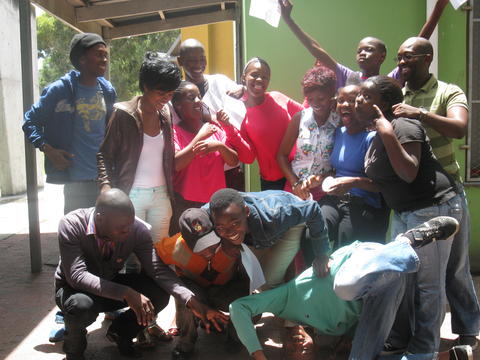

Thursday 3 January 2013 was a jubilant day for IkamvaYouth Nyanga as the Matric results came in. The Matrics made their way to the branch to share their results with staff, fellow students and tutors; and by mid-day, 100% of the learners’ results were accounted for.
Nyanga achieved a whopping 90% pass rate, broken down as follows: 30% bachelor passes and 60% diploma passes. The learners who failed to achieve a senior certificate qualified for supplementary exams.
Esethu Jack, who achieved a bachelor pass, said the following: ‘When I woke up this morning, I was very nervous, but I knew I had a bachelor pass.’ Aphiwe Sobutyu achieved a diploma pass and his mother, Mrs. Sobutyu had this to say: ‘he didn’t need to tell me. I already knew he had a diploma pass because it’s in his blood.’
It is gratifying to share the joy of success with the learners and their parents, and these results have motivated the branch to keep working to support the learners. One of the tutors, Busiswa Dayimani said, ‘these results are good and it makes me so happy to see the learners having done so well.’
Here are some inspirational stories from some of our learners:
Akhona Mtshwelo
Achievement – Bachelor pass
Accepted at UWC to study BCom Accounting
Akhona lives with her siblings and uncle in Lower Crossroads in Cape Town. Studying at home was often difficult for her since there are difficulties at home, with family members prone to picking arguments and fighting with neighbours, even late into the night. This means that she often had to wait for everyone to fall asleep before she could study. Her older siblings also failed to appreciate the hard work she was putting in at school and often gave disparaging remarks about her marks, despite those marks being higher than the grade and class averages.
During the 3rd term of her Matric year, she suffered from a severe knee problem for 4months, which prevented her from attending Saturday classes and afternoon classes at school. However, she persevered and studied alone at home, during that time.
Akhona has made it despite illness during a crucial time of the year, and an unsupportive family system. Her advice to the class of 2013 is that they work hard and have a good attitude towards their studies and teachers because attitude goes a long way.
Nomathamsanqa Dunga
Achievement: Diploma pass
Thami is a young woman whose fighting spirit saw her overcoming debilitating asthma throughout most of her high school years, to emerge as one of her school’s and IY’s success stories. Diagnosed with asthma while in Grade 9, she had to live with the condition, being hospitalized once after a severe attack.
During her Matric year, Thami faced a hostile learning environment at school, when the school combined the Matric Physics classes. She reports that it was similar to learning with one’s enemies, since relations between learners in different classes were far from cordial, at her school. At times she felt afraid to ask questions due to the abuse that would inevitably come from fellow class mates. However, despite all this, Thami worked hard and persevered and is one of the 2012 success stories.
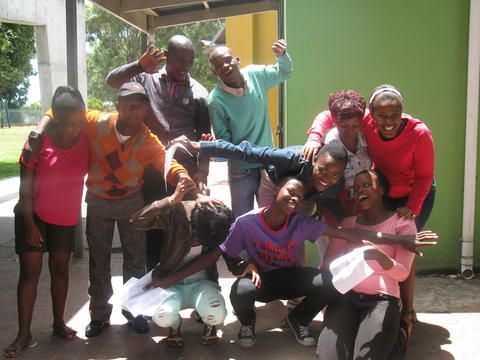


















 Lloyd Lungu
Lloyd Lungu